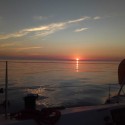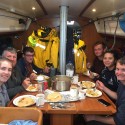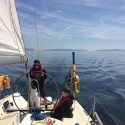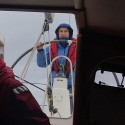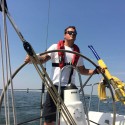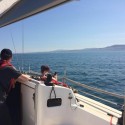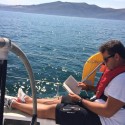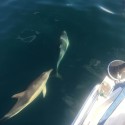Exercise COCKNEY YEOMAN BUCCANEER was an adventurous training (AT) exercise down the west coast of Great Britain using the Royal Armoured Corps’ yacht, Ajax, from the 16th to the 28th June 2018. It was designed to introduce novices to the joys of sailing (myself included) in a two stage journey, with different crews for each of the separate stages. With that aim in mind, as few seasoned sailors as possible were invited (no more than enough to meet the safety requirements), making the organisation of this AT expedition somewhat troublesome as it required lots of very simple questions about the basics of sailing to be answered by those more knowledgeable than myself during the planning phase. Thankfully, I have friends in rather wet places who were able to help me with the dark art of organising offshore sailing.
Most notable of those helping me was 2Lt Mackie, The Royal Yeomanry (RY), who took part in Ex YEOMAN AMPHIBIAN, the Royal Armoured Corps’ entry into the Three Peaks Yacht Race, immediately before joining us on the first half of our journey. With him on the first half of the journey were four members of East Midlands Universities Officer Training Corps (EMUOTC): OCdt Olivia Bugden, OCdt William Kirk, OCdt Tara Moxon and OCdt Mairead Stewart. Additionally, myself (2Lt Wightman, RY) and Mr Flook (Ex-South Notts Hussars) completed the first crew which took the boat from Fort William to Fleetwood. The second crew only consisted of Cpl Smith (RY), Tprs Bamford and Wilbraham (RY) and Tpr Smith (152 Regiment, Royal Logistics Corps) after an unfortunate cancellation from The Royal Lancers, who led the boat from Fleetwood to her final destination just in time to prepare her for participation in an upcoming race. Last, but certainly not least, there was Sgt Hearn, an adult instructor from Durham Army Cadet Force, who was skipper for Ajax over both halves of her journey.
With this expedition being focussed on novice sailors, most of the benefits reaped by the attendees were based around the basics of sailing and not with intricacies in the wider expedition. It was very interesting for me to observe the development of the crew whilst also learning about the boat and sailing myself. Because of this, I would now classify myself as an advocate of sailing, as a method of relief to break up day-to-day mundanity but also as an excellent vehicle for character development – more so than many other forms of AT! This boils down to the types of activity experienced and the size of the expedition team: which is small enough to allow strong personal bonds to be formed and to require a good amount of effort from all members, while being large enough to allow the building of confidence in a team.
Over the duration of the expedition, as part of the learning process towards becoming Royal Yachting Association ‘Competent Crew’, all crew-members were given ample time at the helm of the boat. Here, behind the wheel, an individual has complete control of the boat, provided the other hands on deck work diligently when put to task. The balancing of the boats direction with reference to the wind, while trying to soften the crashing through waves to maintain speed, all the while feeling as though the boat is on the verge of capsizing due to the tilt from savage gusts (despite my protests, I was told on numerous occasions this was not only normal, but that I was being very dramatic) requires good judgement and initiative to anticipate the next gust/wave. By the end of their week on the boat, each crew member felt as though they were now one with sea after having spent so long behind the wheel, analysing and predicting it – when in reality this is an instance when there is always more to learn and we are all still very much novices.
As mentioned above, the person at the helm has command over the boat and the hands on deck, acting as the voice of the boat, issuing order where necessary. When on deck, your responsibilities vary greatly dependant on the weather. In fast-changing conditions you may well be all over the boat, faffing with the headsail, putting reefs in the mainsail to make it smaller or trying to change the headsail entirely on the fly as it’s blown all around you. Working as pairs, we quickly developed our knowledge of and skills on the boat to work together safely and efficiently (we certainly didn’t want to go overboard, but poor or slow drills can leave the boat quite uncontrollable, in turn increasing that risk – toeing the line between the two is essential). Towards the end of our journey, we had the ability to anticipate what would be needed of us before we were told. A prime example of this is working in conjunction with whoever’s at the helm to control the boat by changing the angle of the mainsail with reference to the hull in time with the gusts of wind. This was an act that we started doing silently, as all crewmembers understood what was best for the boat and the basic intent of the helmsman, who could confidently allow us to act under our own initiative to get the job done (one might say that we started to form quite a good team!).
While sitting on a boat for a week or two may sound like a lazy holiday and not at all adventurous, I can safely say that for the most part there is nothing lazy about it. The activity is surprisingly fatiguing, despite what feels like a significant lack of movement (you certainly can’t prepare yourself for a fitness assessment when on a 35ft yacht). The source of this fatigue is from constant mental alertness and battling the weather – both of which are often made harder when sailing at night and working on 3-hour shifts, as we did. If it weren’t for the constant reminders from the seasoned crew members in the early stages of our journey, all us novices would have risked succumbing to sun-stroke, poor nourishment, dehydration and fatigue. In each crew rotation we delegated one person to monitor drinking, one to monitor food intake and another to monitor fatigue. The result was lots of water being quaffed, lots of snacks being munched and lots of jokes being cracked in a process that required a surprising amount of self-discipline and the occasional burst of leadership to boost morale in the dark of the night in order to maintain alertness and keep the boat with sleeping crew below deck safe. This discipline was required even more so for the under-manned crew of the second half of Ajax’s journey who had very hot weather most days and even less sleep when sailing through the night.
Overall, I would argue this expedition was a brilliant success for those who attended with regards to personal development, with all of them saying they would happily sail again. I would especially recommend using a similar crew structure, consisting mostly of members of the same knowledge level, as their shared development further enhances the bonding and sense of working towards team goals, not individual ones. For both OCdts and soldiers, a short time of a week on a boat is enough to develop their character to the point that they will undoubtedly learn or improve skills that can be applied elsewhere.
In terms of the wider success of this expedition, there are aspects that leave more to be desired. The Reserves uses the promise of AT as a recruitment tool as much as the Regular Army does, if not more so. As such, I am glad that this expedition was able to accommodate serving soldiers in its nominal role, giving them a deserved boost to morale and holding true to promises made earlier in their career, helping to retain their interest in the Reserves. For those officer cadets who attended, this example of AT offers them a strong argument for recruitment through any route into the Armed Forces. However, beyond this small group of attendees, the success of the expedition has been rather small due to limited success on social media – a point which I implore future expedition leaders to bear in mind during their shaping and decisive planning phases, as there is massive potential for improving recruitment, retention and morale with todays technology. Just don’t let your phone be destroyed by salt-water in the early stages of your expedition… Much like mine was.
“When I think back it seems like I’ve not done a lot of demanding work, yet I know I’m physically and mentally tired. Both relaxing and stimulating – I imagine I’ll be doing this again sometime!”
Ocdt Tara Moxon, EMUOTC
Author: 2Lt Joe Wightman, The Royal Yeomanry

